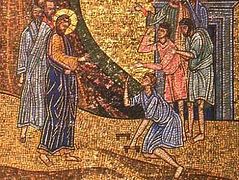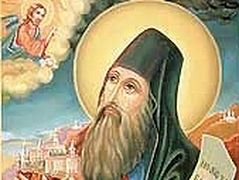Today the Church preaches about love for enemies. Man cannot love his enemies. We cannot say, “I love someone I hate.” But we must love our enemies. What does this mean—our enemies? In fact, as the Holy Fathers teach, Christians have only one enemy: the adversary of God, the enemy, the slanderer, satan, the devil. If we are at enmity with other people and hate them, we are in the power of the devil, and we will not break out of this hell until we learn to love one another. Nevertheless, Christ uses the word “enemies”, referring to people with whom we have entered into such a relationship. Christ doesn’t want to set us against each other in hatred, but He came to overturn the tables of the moneychangers in the Temple and to disturb the world of the wicked and the impious—satan must be crushed. Preaching about love for enemies cannot mean agreeing with their lies, with their impudence.
In our Christian life we cannot avoid conflicts. Since we are Christians, we are at the very center of the confrontation between good and evil, and we must be ready for any rejection, any persecution and hatred of the world. The disciple is not above his master, nor the servant above his lord (Mt. 10:24). How often we are inclined to think otherwise! We don’t expect to be crucified for preaching Christ; to the contrary, we hope for approval, admiration, respect, and acceptance by the world. And we seek this approval not only when we cover up evil instead of exposing it out of cowardice and under the pretext of love, but even when we expose this evil fearlessly and enthusiastically—although we have still not achieved by this Christ’s commandment to love our enemies. The victory of Christ’s love is accomplished at the cost of the Cross and Resurrection. These things I have spoken unto you, says Christ, that in Me ye might have peace. In the world ye shall have tribulation—you will be opposed by thousands of enemies—but be of good cheer; I have overcome the world (Jn. 16:33). To call Himself the Victor and invite us to taste the victorious peace in Him when the enemy is ready to crush Him completely—this is the mystery of the commandment that is being announced to us today. The Lord—the Lamb in the midst of the wolves that are about to tear Him to pieces and devour Him—wants to breathe courage into us, so we may not be afraid of anything.
When all human considerations have stopped, our whole lives should be turned to this mystery. Our calling is to bring Christ into every circumstance of our lives, no matter what it costs us; and this price is His Golgotha, and ours, also. Just as we cannot be born again without dying to ourselves, so we cannot participate in the victory of Christ without being ready to share with Him the dangers of trial—without taking up our cross.
Love for enemies is the gift of Christ’s prayer for all who crucified Him on the Cross. That is why the Holy Fathers say that to love our enemies means to pray for them. And they teach us to always offer up a prayer for our enemies before praying. If we want to be heard by God, we must begin our prayer by praying for those who hate us; for sinners—those who don’t know Christ—as well as love those those love them (cf. Lk. 6:32), testifying that the light in man, whatever he may be, has not been extinguished completely. In them, love of their neighbor can even be love for God, Whom they don’t know. But as long as this love doesn’t reach God’s dimension—abundant life of the Holy Trinity—hatred, death and destruction still reign in us and in the world. For if ye love them which love you, what thank have ye?
Only by loving our enemies can we receive grace and become partakers of Christ’s victory. With all the sinfulness of our nature, we resist this commandment, which means the cross. Man himself cannot become a cross, and God comes to his aid—on the Cross and before His ascent to the Cross. Being sinless, Christ prays in the Garden of Gethsemane for the cup of suffering to be taken away from Him. The cup contains suffering, and it must be emptied to the last drop of its bitter content. He gives His life to the end for the salvation of the world. From now on, there is an indestructible connection between God and man, between the Son of God and sinners, between His redemptive Passion and our enmity with each other. Inasmuch as we were saved by Christ, we can be partakers of the most sublime Divine love.
Soon after the 1917 revolution in Russia, St. Makary (Nevsky; 1835–1926), Metropolitan of Moscow and Kolomna, who was illegally removed from his cathedra by the Provisional Government, had the following vision:
“I saw a field. The Savior was walking along a path. I went after Him, affirming, ‘Lord I am following Thee!’ And He, turning to me, replied, ‘Follow Me!’ Finally we approached an immense arch adorned with stars. At the threshold of the arch the Savior turned to me and said again, ‘Follow Me!’ Then He went into a wondrous garden, and I remained at the threshold and awoke.
“Soon I fell asleep again and saw myself standing in the same arch, and with the Savior stood Tsar Nicholas Alexandrovich. The Savior said to the Tsar, ‘You see in My hands two cups: a bitter one for your people, and a sweet one for you.’
“The Tsar fell to his knees and for a long time begged the Lord to allow him to drink the bitter cup instead of his people. The Lord did not agree for a long time, but the Tsar begged importunately. Then the Savior drew out of the bitter cup a large glowing coal and laid it in the palm of the Tsar’s hand. The Tsar began to move the coal from hand to hand and at the same time his body began to grow light, until it had become completely bright, like a radiant spirit.
“At this I again woke up. Falling asleep yet again, I saw an immense field covered with flowers. In the middle of the field stood the Tsar surrounded by a multitude of people, and with his hands he was distributing manna to them. An invisible voice said then, ‘The Tsar has taken the guilt of the Russian people upon himself, and the Russian people are forgiven’.”[1]
What is the secret of the power of the holy Tsar’s prayer? In faith in the Lord and in love for his enemies. Was it not for this faith that the Son of God promised such powerful prayer, prayer that can move mountains? And today we reflect over and over again on the holy Emperor’s final reminder: “The evil that is now in the world shall grow even stronger; but it is not evil that will conquer evil—only love.”
A person cannot become a cross himself—he can only bear his sufferings. But he can unite his own prayer with the prayers of his neighbor, the Church, all the martyrs and saints, and with the prayers of all the sinners who hope in the Cross of Christ. Nobody lives alone. For a Christian any person—both saint and sinner—is a neighbor. In the grace and love of the Most Holy Trinity, he is called to bear everyone, because we bear this love of God and of other people. Everything is given to a Christian, and he can only give what is given to him. All who pray, repent, suffer and resist wickedness and lies, are striving for this love.
In the world of enmity, a man will soon appear who will exalt himself above all else, whom the Lord shall consume with the spirit of His mouth (2 Thess. 2:8). How can we attain the spirit of love that smites Christ’s enemies? In a world where everyone is overcome with hatred, Who is he that overcometh the world, but he that believeth that Jesus is the Son of God?, says the Apostle John the Evangelist (1 Jn. 5: 5).
How clearly the Lord reveals the essence of our faith! To love those who don’t love us, to do good to those who don’t do us good, to give to those from whom we don’t hope to receive in return—to be divine by the gift of Christ, to be like God by our cross. To love sinners because sinners also love those who love them; because, as Blessed Augustine says, the neighbor whom you hate and whom you consider your enemy is in fact your brother.




